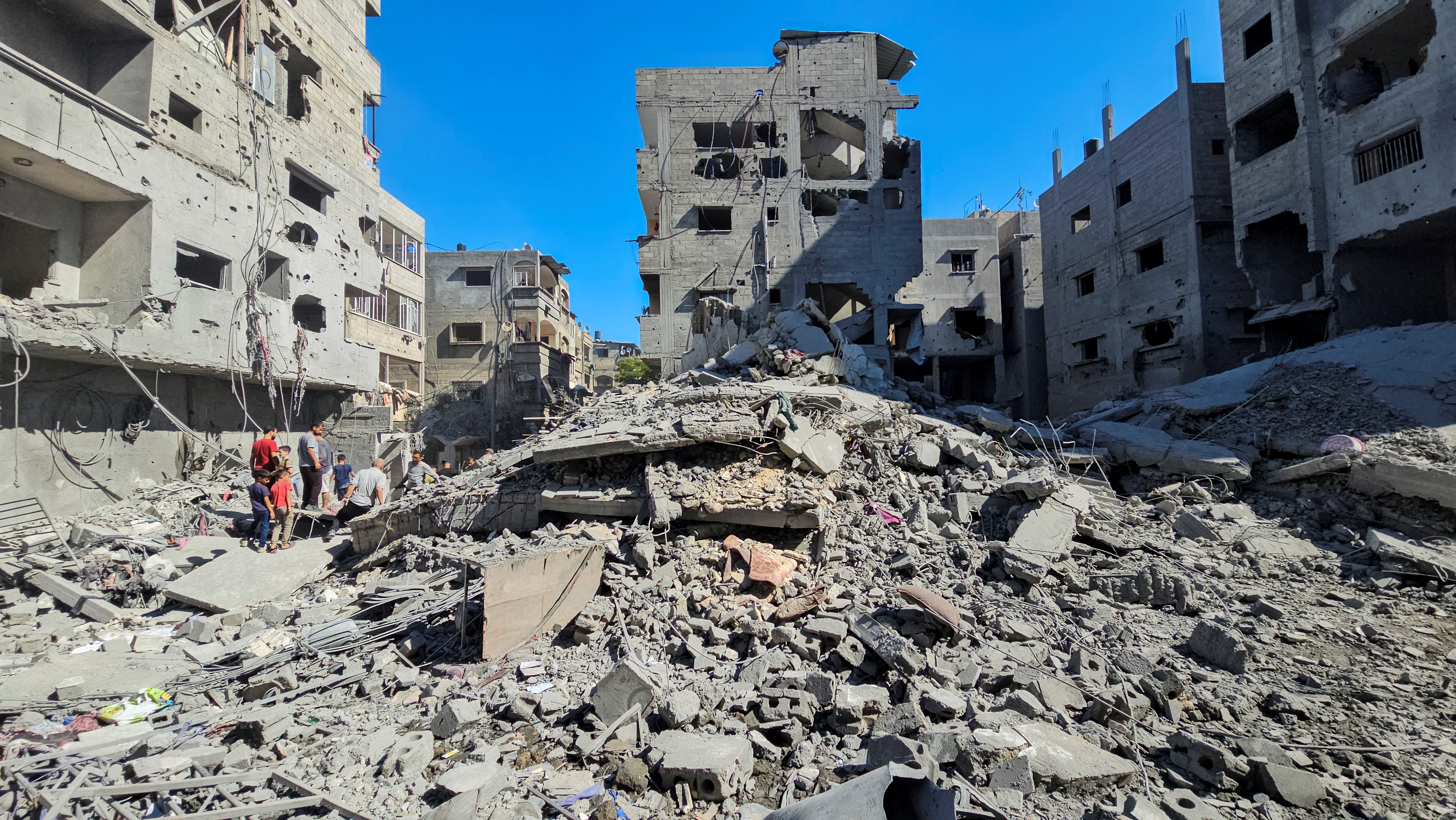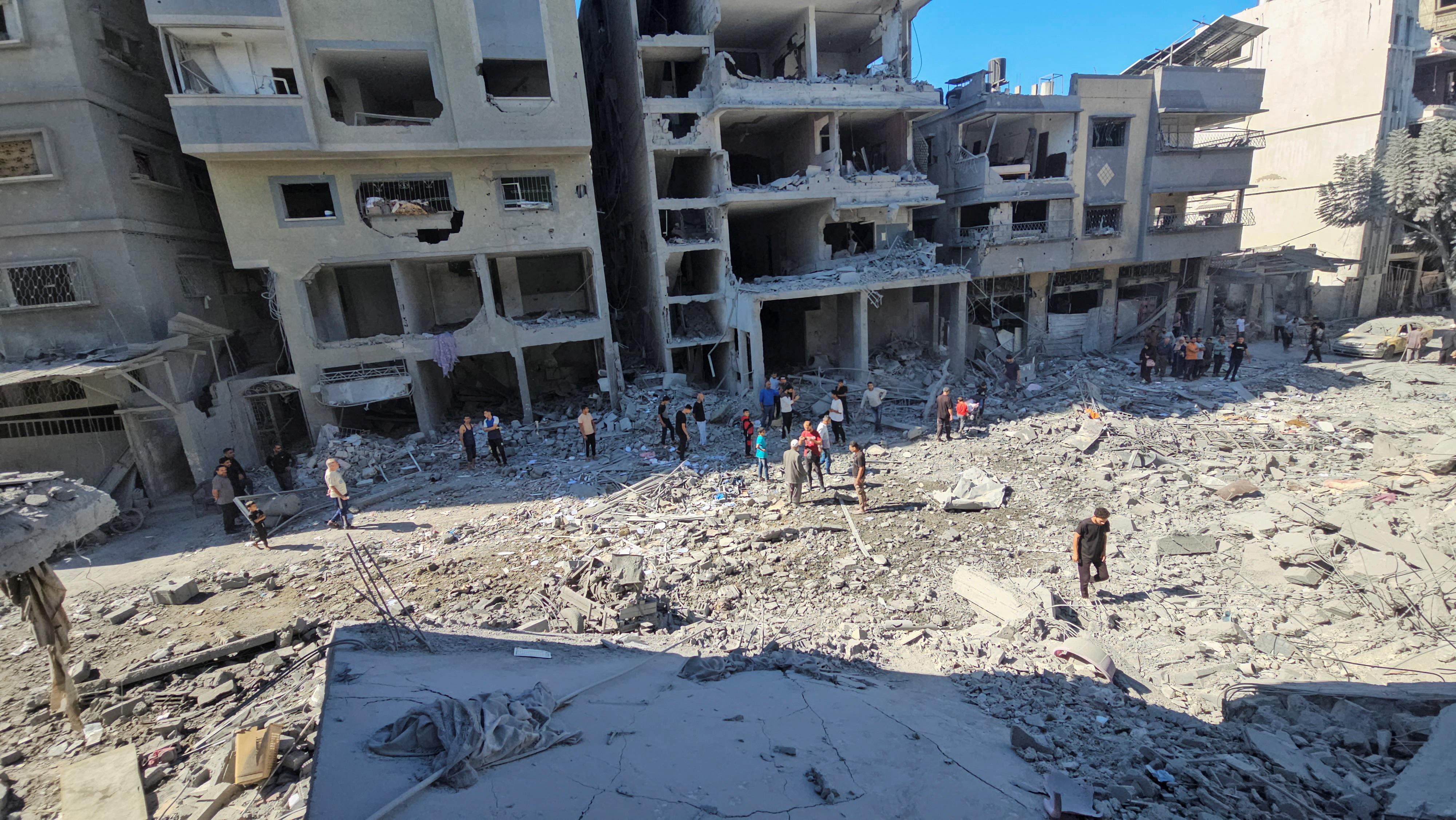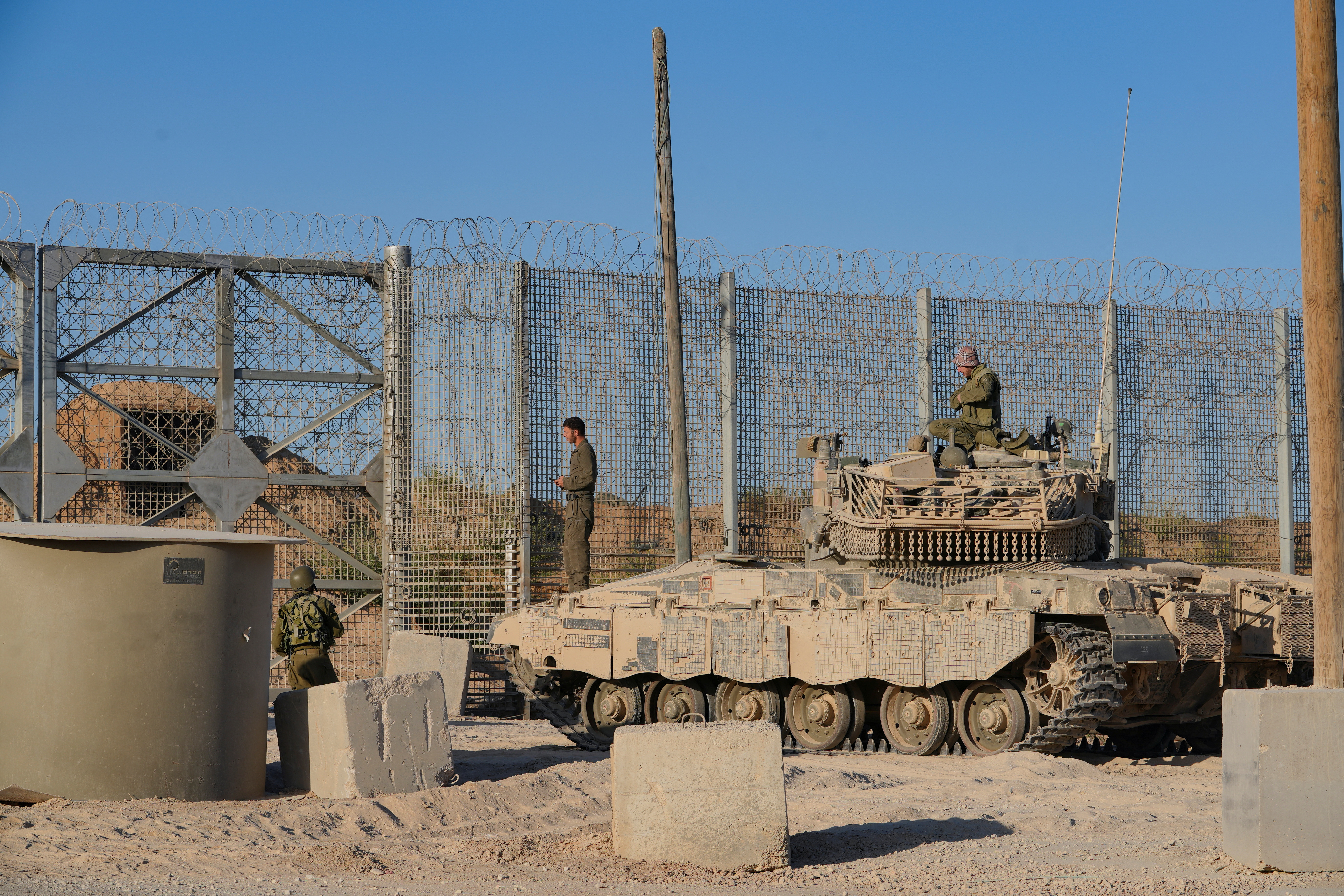Drone image shows displaced people in Jabalia, in this picture obtained from social media on October 21, 2024. Avichay Adraee via X/via REUTERS

Palestinians gather at the site of Israeli strikes on houses and residential buildings, amid the ongoing Israel-Hamas conflict, in Beit Lahiya, in the northern Gaza Strip October 20, 2024. REUTERS
 Palestinians gather at the site of Israeli strikes on houses and residential buildings, amid the ongoing Israel-Hamas conflict, in Beit Lahiya, in the northern Gaza Strip October 20, 2024. REUTERS
Palestinians gather at the site of Israeli strikes on houses and residential buildings, amid the ongoing Israel-Hamas conflict, in Beit Lahiya, in the northern Gaza Strip October 20, 2024. REUTERS

Israeli soldiers look on from atop a military vehicle near the Israel-Gaza border, amid the ongoing conflict in Gaza between Israel and Hamas, in southern Israel, October 21, 2024. REUTERS
- Israeli troops besiege hospitals in northern Gaza
- Food, water running out
- Operations intensify after the death of the Hamas leader
- UN says it is deeply concerned by the situation
CAIRO, Oct 21 (Reuters) – Israeli military forces besieged hospitals and shelters for displaced people in the northern Gaza Strip on Monday as they stepped up their operations, preventing critical aid from reaching civilians, residents and medics said.
Troops rounded up men and ordered women to leave the Jabalia historic refugee camp, they said. An Israeli airstrike on a house in Jabalia killed five people and wounded several others, medics said.
The U.N. Palestinian refugee agency UNRWA said Israeli authorities were preventing humanitarian missions from reaching areas in the north of the Palestinian enclave with critical supplies, including medicine and food.
“People attempting to flee are getting killed, their bodies left on the street,” UNRWA head Philippe Lazzarini said on X.
Medics at the Indonesian Hospital told Reuters that Israeli troops stormed a school and detained the men before setting it ablaze. The fire reached hospital generators and caused a power outage, they added.
Health officials said they had refused orders by the Israeli army, which started a new incursion into the territory’s north over two weeks ago, to evacuate the three hospitals in the area or leave the patients unattended.
Later on Monday, Hussam Abu Safiya, director of Kamal Adwan Hospital said at least two critically wounded patients at the facility’s intensive care unit died because of the lack of medical supplies.
“The hospital’s blood units have run out completely… We are implementing a priority treatment method for patients. This is the reality,” said Abu Safiya in a video message to media outlets.
Troops remained outside the hospital but did not enter, they said. Medics at a second hospital, Kamal Adwan, reported heavy Israeli fire near the hospital at night.
“The army is burning the schools next to the hospital, and no one can enter or leave the hospital,” said one nurse at the Indonesian Hospital, who asked not to be named.
Palestinian health officials said at least 18 people had been killed in Jabalia and eight elsewhere in Gaza in Israeli strikes.
The Israeli military said in a statement its troops had dismantled infrastructure and tunnel shafts and killed alleged fighters in the Jabalia area.
Troops had helped thousands of civilians to evacuate safely through organised routes, it said, contradicting reports from the U.N. aid agency. Israel was in contact with the international community and Gaza’s healthcare system to ensure hospital emergency services were operating, it said.
Last week, the United States told Israel it must take steps in the next month to improve the humanitarian situation in Gaza or face potential restrictions on U.S. military aid.
Israel has intensified its campaigns both in Gaza and Lebanon after the killing of Hamas leader Yahya Sinwar last week had raised hopes of an opening for ceasefire talks to end more than a year of conflict.
It has vowed to eradicate Hamas, the group who formerly controlled Gaza and whose attack on Israel last year triggered the war, but in doing so has laid waste to much of the territory and killed tens of thousands of people. More than 1.9 million people have been left destitute and desperate for food.
“We are facing death by bombs, by thirst and hunger,” said Raed, a resident of Jabalia camp. “Jabalia is being wiped out and there is no witness to the crime, the world is blinding its eyes.”
FORCED TO LIVE IN TOILETS
Hadeel Obeid, a supervisor nurse at the Indonesian hospital, said they were running out of medical supplies, including sterile gauze and medications. The water supply has been cut off and there was no food for the fourth consecutive day, she told Reuters.
The United Nations said it had been unable to reach the three hospitals in northern Gaza.
The U.N. Human Rights Office accused Israeli forces of unlawful interference with humanitarian assistance and issuing orders that were causing forced displacement. It said their conduct “may be causing the destruction of the Palestinian population in Gaza’s northernmost governate through death and displacement”.
UNRWA’S Lazzarini said injured people were lying without care in hospitals that had been hit.
“UNRWA remaining shelters are so overcrowded, some displaced people are now forced to live in the toilets,” he said.
Israel says it is getting large quantities of humanitarian supplies into Gaza with land deliveries and airdrops. It also says it has facilitated the evacuation of patients from the Kamal Adwan Hospital.
Palestinians say no aid entered northern Gaza areas where the operation is active.
Reuters reported earlier this month that food supplies have fallen sharply since Israeli authorities introduced a new customs rule on some humanitarian aid and are separately scaling down deliveries organized by businesses.
Residents and medics said Israeli forces had tightened their siege on Jabalia by positioning tanks in nearby Beit Hanoun and Beit Lahiya towns and ordering residents to leave.
Israeli officials said evacuation orders were aimed at separating Hamas fighters from civilians and denied there was any systematic plan to clear out civilians. It said its forces operating in northern Gaza killed scores of people it accused of being Hamas gunmen.
Hamas accused Israel of carrying out acts of “genocide and ethnic cleansing” to force people to leave northern Gaza. Israel also faces charges of violations of the 1948 Genocide Convention at the International Court of Justice.
The Hamas armed wing said fighters attacked forces there with anti-tank rockets and mortar fire, and detonated bombs against troops inside tanks and stationed in houses.
Elsewhere in the enclave, Israeli strikes killed at least five people in Rafah in the southern Gaza Strip and four in two separate strikes in Gaza City, medics said.
The slain Sinwar was one of the alleged masterminds of the Oct. 7, 2023, cross-border attack on Israeli communities that killed around 1,200 people, with about 253 more taken back to Gaza as hostages, according to Israeli tallies.
Israel’s subsequent bombardment of Gaza has killed more than 42,500 Palestinians, with another 10,000 uncounted dead thought to lie under the rubble, Gaza health authorities say.
Reporting and writing by Nidal al-Mughrabi; Editing by Angus MacSwan

 Palestinians gather at the site of Israeli strikes on houses and residential buildings, amid the ongoing Israel-Hamas conflict, in Beit Lahiya, in the northern Gaza Strip October 20, 2024. REUTERS
Palestinians gather at the site of Israeli strikes on houses and residential buildings, amid the ongoing Israel-Hamas conflict, in Beit Lahiya, in the northern Gaza Strip October 20, 2024. REUTERS




